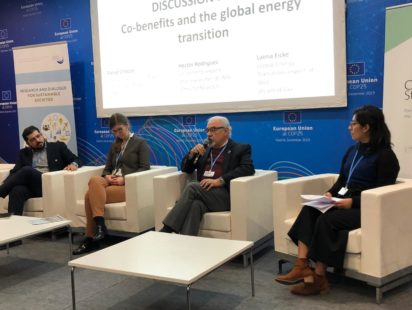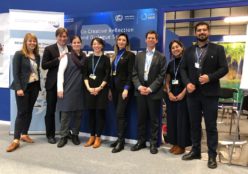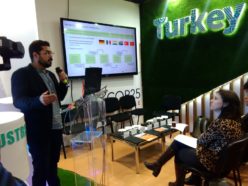
During the first week of the COP25 in Madrid, the COBENEFITS team co-organised and participated in diverse discussions and panels. How can co-benefits be actively mobilized for ambitious and early action? How can just transition measures be effectively included into NDCs? Through discussion with local practitioners, diverse NGO representatives and COP25 attendants, the milestones for more ambitious climate action were defined as the scientific local research on the social and economic opportunities of climate action and the effective communication of these co-benefits.
Amongst others, increased employment for middle- and high-skilled workers in Turkey, reliable energy supply through wind turbines in Vietnam, roughly one million USD energy-costs savings per year in Mexico’s public buildings through energy efficiency, and many other co-benefits of climate action were discussed by the COBENEFITS team at COP25.
At the EU Pavilion, the discussion on “Mobilising Co-Benefits and raising NDC ambition with Just Transitions” was enriched with the perspective from Ana Toni, director of the Instituto Clima e Sociedade (iCS) from Brazil. It was emphasized how only effective social inclusion of both rural and urban populations at the Amazonia region will be able to holt deforestation and consequently the strengthening of Brazil’s NDC. Furthermore, Daniel Chacon, energy director from Iniciativa Climatica de Mexico, presented the work with COBENEFITS as an example of the ownership principle and capacity building as drivers for switching high-level discussions of climate action to hands-on work at the local level.

National and non-governmental actors showcased strategies to tackle both climate and air quality challenges at the UNFCCC´s side event “Strengthening climate promises: near-term mitigation via joint action on NDC provisions & air quality”. Mara Gomez from the COBENEFITS team presented the South African research studies on increased renewable energy deployment in South Africa and its impact in the health sector, “multilateral dialogues are a milestone to achieve clean energy pathways”, added the researcher. Results from South Africa studies are summarised in the following link. Additionally, Svenja Schulze, Federal Minister for the Environment, Nature Conservation and Nuclear Safety from Germany, also pointed to the opportunities of climate action when opting for renewable energies instead of coal, emphasizing the COBENEFITS research on the topic.
At the SDG Pavilion, UNDP and local representatives from Latin America and Kenya discussed the impact of energy access to fulfilling SDGs’ goals. At the “NDC Transformative potential of small-scale energy access investments: linking community action to SDGs and NDC implementation” discussion, narrowing the gap between local and national policy-making was addressed. The COBENEFITS research on the topic refers to evaluating the best energy option for rural communities in Vietnam, which geographic particularities make it a challenge to connect to the national grid. The executive reports on Vietnam can be found in our Resources section.

In the Turkey pavilion, the discussion on “Social and Economic Co-Benefits of Climate Change Mitigation: Employment, Industrial Development and Energy Transition” compared the employment opportunities of increased deployment of solar energy in Turkey and Mexico. Over 7,400 FTE jobs along the solar value chain and more than 59,000 FTE jobs along the wind value chain will be created in Turkey in the next ten years alone with the current energy policy. “In Mexico, in the construction phase, all RE technologies outperform fossil power generation technologies, particularly wind power with more than 21 job-years per installed MW and PVDG with around 9.5 job-years per installed MW” presented COBENEFITS researcher Hector Rodriguez.